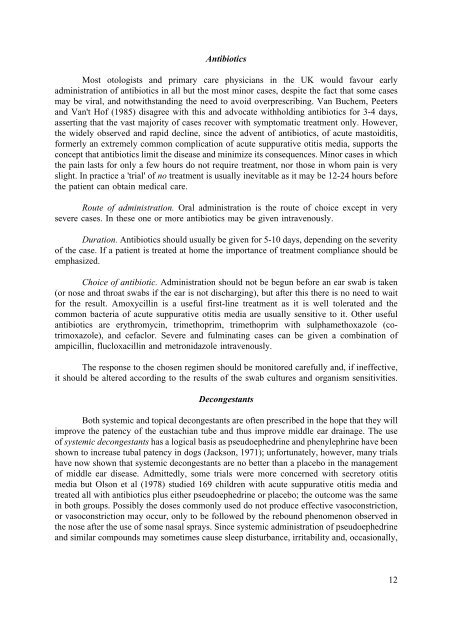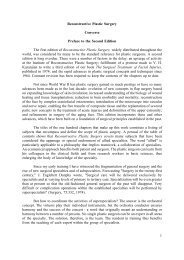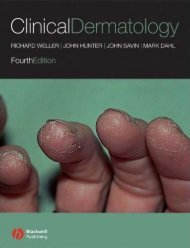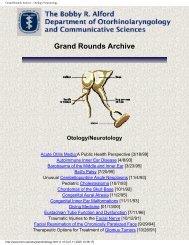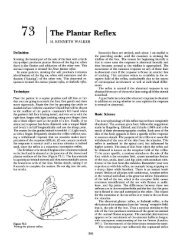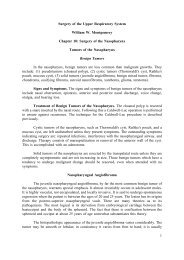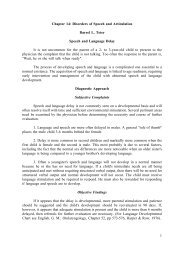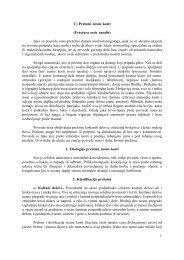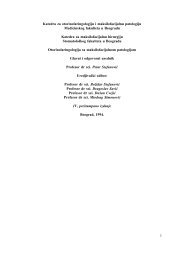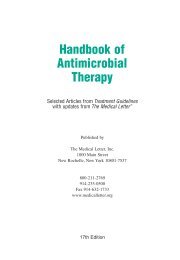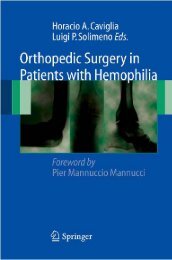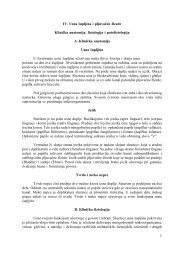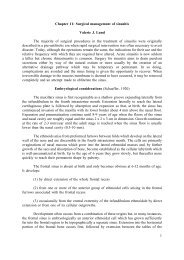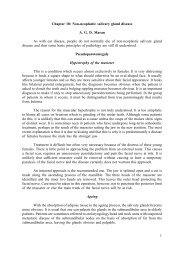1 Chapter 13: Acute suppurative otitis media and acute mastoiditis ...
1 Chapter 13: Acute suppurative otitis media and acute mastoiditis ...
1 Chapter 13: Acute suppurative otitis media and acute mastoiditis ...
You also want an ePaper? Increase the reach of your titles
YUMPU automatically turns print PDFs into web optimized ePapers that Google loves.
Antibiotics<br />
Most otologists <strong>and</strong> primary care physicians in the UK would favour early<br />
administration of antibiotics in all but the most minor cases, despite the fact that some cases<br />
may be viral, <strong>and</strong> notwithst<strong>and</strong>ing the need to avoid overprescribing. Van Buchem, Peeters<br />
<strong>and</strong> Van't Hof (1985) disagree with this <strong>and</strong> advocate withholding antibiotics for 3-4 days,<br />
asserting that the vast majority of cases recover with symptomatic treatment only. However,<br />
the widely observed <strong>and</strong> rapid decline, since the advent of antibiotics, of <strong>acute</strong> <strong>mastoiditis</strong>,<br />
formerly an extremely common complication of <strong>acute</strong> <strong>suppurative</strong> <strong>otitis</strong> <strong>media</strong>, supports the<br />
concept that antibiotics limit the disease <strong>and</strong> minimize its consequences. Minor cases in which<br />
the pain lasts for only a few hours do not require treatment, nor those in whom pain is very<br />
slight. In practice a 'trial' of no treatment is usually inevitable as it may be 12-24 hours before<br />
the patient can obtain medical care.<br />
Route of administration. Oral administration is the route of choice except in very<br />
severe cases. In these one or more antibiotics may be given intravenously.<br />
Duration. Antibiotics should usually be given for 5-10 days, depending on the severity<br />
of the case. If a patient is treated at home the importance of treatment compliance should be<br />
emphasized.<br />
Choice of antibiotic. Administration should not be begun before an ear swab is taken<br />
(or nose <strong>and</strong> throat swabs if the ear is not discharging), but after this there is no need to wait<br />
for the result. Amoxycillin is a useful first-line treatment as it is well tolerated <strong>and</strong> the<br />
common bacteria of <strong>acute</strong> <strong>suppurative</strong> <strong>otitis</strong> <strong>media</strong> are usually sensitive to it. Other useful<br />
antibiotics are erythromycin, trimethoprim, trimethoprim with sulphamethoxazole (cotrimoxazole),<br />
<strong>and</strong> cefaclor. Severe <strong>and</strong> fulminating cases can be given a combination of<br />
ampicillin, flucloxacillin <strong>and</strong> metronidazole intravenously.<br />
The response to the chosen regimen should be monitored carefully <strong>and</strong>, if ineffective,<br />
it should be altered according to the results of the swab cultures <strong>and</strong> organism sensitivities.<br />
Decongestants<br />
Both systemic <strong>and</strong> topical decongestants are often prescribed in the hope that they will<br />
improve the patency of the eustachian tube <strong>and</strong> thus improve middle ear drainage. The use<br />
of systemic decongestants has a logical basis as pseudoephedrine <strong>and</strong> phenylephrine have been<br />
shown to increase tubal patency in dogs (Jackson, 1971); unfortunately, however, many trials<br />
have now shown that systemic decongestants are no better than a placebo in the management<br />
of middle ear disease. Admittedly, some trials were more concerned with secretory <strong>otitis</strong><br />
<strong>media</strong> but Olson et al (1978) studied 169 children with <strong>acute</strong> <strong>suppurative</strong> <strong>otitis</strong> <strong>media</strong> <strong>and</strong><br />
treated all with antibiotics plus either pseudoephedrine or placebo; the outcome was the same<br />
in both groups. Possibly the doses commonly used do not produce effective vasoconstriction,<br />
or vasoconstriction may occur, only to be followed by the rebound phenomenon observed in<br />
the nose after the use of some nasal sprays. Since systemic administration of pseudoephedrine<br />
<strong>and</strong> similar compounds may sometimes cause sleep disturbance, irritability <strong>and</strong>, occasionally,<br />
12


